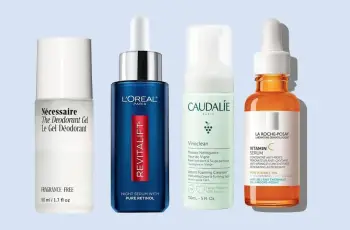
Are Dirty Makeup Brushes Really That Bad for Your Skin?
Applying makeup can be a simple, even indulgent ritual. You reach for your favorite products, ready to enhance your look with just a few strokes.
But how often do you think about cleaning your makeup brushes? Probably not enough.
Many people neglect their brushes until they notice they don’t perform as well—or worse, their skin reacts negatively.
Unfortunately, by then, those brushes may have become a breeding ground for harmful bacteria and other microbes.
We consulted two dermatologists to explore the hidden dangers of dirty makeup brushes. What we learned might just change your makeup routine for good.
Why Dirty Makeup Brushes Are a Serious Concern
Makeup brushes don’t just hold leftover foundation or eyeshadow. They can harbor a variety of bacteria and fungi that thrive in the bristles.
Dr. Hannah Kopelman, a board-certified dermatologist and podcast host, stresses the importance of clean brushes. “Maintaining clean makeup brushes is crucial for healthy skin,” she says.
Dirty brushes accumulate oils, dead skin, and bacteria, creating a perfect environment for germs to multiply.
Dr. Donald B. Yoo, a facial plastic surgeon and medical director of HALO Beverly Hills, adds that brushes pick up germs from many sources.
These include your skin’s natural flora, environmental bacteria, and even microbes from water faucets or hot tubs.
He explains, “Common skin bacteria like Staphylococcus aureus and Streptococcus, gut bacteria such as E. coli, and water-based germs like Pseudomonas can all find their way onto brushes and multiply quickly.”
This makes dirty brushes more than just an inconvenience—they’re a potential health hazard.
How Dirty Brushes Affect Your Skin
The consequences of using dirty brushes go beyond poor makeup application. These brushes can trigger a variety of skin problems, ranging from acne to irritation.
Acne Breakouts
The bacteria and oils trapped in your brushes transfer directly to your skin every time you apply makeup.
Dr. Yoo explains that this bacterial transfer clogs pores and sebaceous ducts, worsening inflammation and causing acne breakouts.
Dr. Kopelman highlights how the combination of oil, dead skin cells, and bacteria on unwashed brushes creates an ideal setting for acne-causing bacteria to thrive.
This is particularly problematic for those with sensitive or acne-prone skin, who might find their conditions worsening with dirty tools.
Skin Irritation
Have you ever noticed that a grimy brush feels scratchy or uncomfortable? That’s because dirty brushes can irritate your skin.
Dr. Kopelman notes that bacteria and debris interfere with the natural function of sebaceous glands, which secrete oils that protect and moisturize your skin.
Dr. Yoo explains that clogged sebaceous ducts caused by dirty brushes can inflame your skin and damage its protective barrier. This leads to redness, irritation, and increased vulnerability to infections.
Over time, neglecting brush hygiene can weaken your skin’s natural defenses. Dr. Kopelman warns that this can make your complexion more sensitive and prone to damage.
How Often Should You Clean Your Makeup Brushes?
If you haven’t been cleaning your brushes regularly, don’t worry—you’re not alone. Many people clean their brushes far less than they should.
Both experts agree on one rule: clean your brushes at least once a week. Dr. Kopelman says, “Regular cleaning prevents skin issues and improves makeup application.”
Patients who keep their brushes clean notice smoother, more even makeup finishes.
Cleaning also prolongs your brushes’ lifespan. Dirty bristles become stiff and ineffective, while clean ones stay soft and flexible—key for flawless makeup.
Dr. Kopelman emphasizes proper cleaning techniques. “Be gentle. If brushes aren’t cleaned properly or are dried incorrectly, the bristles can lose their shape and performance.”
Dr. Yoo recommends using warm water and a mild cleanser like baby shampoo. After washing, lay brushes flat to dry. This prevents water from weakening the handle and keeps the bristles in good shape.
When to Replace Your Brushes or Sponges
Even with great care, makeup brushes and sponges don’t last forever. Over time, they wear down and become less effective or hygienic.
Dr. Kopelman advises replacing brushes when they stop performing well despite cleaning. This might mean they shed bristles, lose shape, or retain stubborn product residue.
Dr. Yoo adds that if your brushes show excessive fraying or if the bristles feel rough and uneven, it’s time to invest in new tools. Using worn-out brushes can undo all the benefits of a clean routine.
Replacing your brushes regularly keeps your skin safe and your makeup flawless. It’s worth investing in quality brushes that can hold up to cleaning and regular use.
Final Thoughts: Clean Brushes = Healthy Skin
Dirty makeup brushes pose more than just cosmetic problems. They can harbor bacteria from your skin and environment—everything from E. coli to fungi.
These germs transfer to your skin, causing acne, irritation, and even weakening your skin’s natural barrier.
Luckily, keeping your brushes clean is a simple fix. Weekly washing with warm water and gentle cleanser prevents microbial buildup and keeps your brushes soft and effective.
Taking care of your brushes also saves you money. Clean brushes last longer and perform better, so your makeup looks smoother and stays put.
Eventually, brushes wear out and need replacing. But with regular cleaning and proper care, you get the best results and protect your skin from the harmful effects of dirty makeup tools.
Bonus Tips for Brush Care
Always clean your brushes on a regular schedule—set a weekly reminder if needed.
Avoid using harsh detergents or strong chemicals on brushes; mild baby shampoo or gentle brush cleansers are ideal.
Dry brushes flat on a towel instead of upright to maintain their shape and prevent water damage.
Store brushes in a clean, dry place, away from bathrooms or damp environments where bacteria thrive.
Consider using brush guards or covers for travel or storage to keep bristles protected.
Your makeup routine is a moment of self-care, so don’t let dirty brushes sabotage your skin’s health.
Clean them regularly, treat your tools with care, and your skin will thank you with a clearer, healthier glow.


